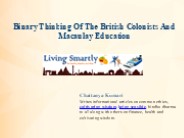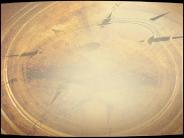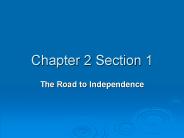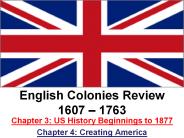Colonist PowerPoint PPT Presentations
All Time
Recommended
The Europeans, including the British, are generally guilty of ‘binary thinking’ where they conclude that things are just good or bad. They refuse to admit that there can also be something that is ‘in between.’ So, it can be said that, for them, everything is either ‘totally black’ or ‘completely white,’ and they don’t accept the possibility of ‘gray.’
| PowerPoint PPT presentation | free to download
The Early American Colonists were the first people in our country's history to ... The American Revolution, itself, is probably one of the biggest acts of civil ...
| PowerPoint PPT presentation | free to view
Born into the family of a Boston candle maker, Benjamin Franklin became the most ... Writer, inventor, diplomat, businessman, musician, scientist, humorist, civic ...
| PowerPoint PPT presentation | free to view
18 minutes ago - COPY LINK TO DOWNLOAD = pasirbintang3.blogspot.com/?klik=0812219392 | PDF/READ The Native Ground: Indians and Colonists in the Heart of the Continent (Early American Studies) | In The Native Ground, Kathleen DuVal argues that it was Indians rather than European would-be colonizers who were more often able to determine the form and content of the relations between the two groups. Along the banks of the Arkansas and Mississippi rivers, far from Paris, Madrid, and London, European colonialism met neither accommodation nor resistance but incorporation. Rather than being colonized, Indians drew European empires into local patterns of land and resource allocation, sustenance, goods exchange, gender relations, diplomacy, and warfare. Placing Indians at the center of the story, DuVal shows both their diversity and our contempor
| PowerPoint PPT presentation | free to download
... time to time is necessary by milking, bee keeping, harvesting, threshing, and ... Everything a family had was produced in the home and most likely by the women. ...
| PowerPoint PPT presentation | free to view
The Lenape and the Colonists The Lenape and the Colonists We will learn about each culture, what they looked like, why they came here and how they lived.
| PowerPoint PPT presentation | free to view
This act led to the the biggest act of civil disobedience in our country's history. ... The American Revolution is the biggest example of the colonists civil ...
| PowerPoint PPT presentation | free to view
The Colonists Resist Tighter Control A Portrait of Crispus Attucks Being Shot In the Boston Massacre Pontiac s War After the war, Britain continues to struggle with ...
| PowerPoint PPT presentation | free to download
Slide 1
| PowerPoint PPT presentation | free to view
Anthozoan Life Cycle. Brusca and Brusca 2003. Seamounts are sites of endemism. ... Enhanced food supply causes high benthic biomass ...
| PowerPoint PPT presentation | free to download
Activity 7: Colonists and Native American Cooperation (GLE: 36) Ex. Braddock's Road ... Examples of Native Americans' Cooperation with Colonists ...
| PowerPoint PPT presentation | free to view
... (settlement size and area), arability (soils and vegetation) and defensibility ... settlement characteristics of habitability, arability and defensibility. ...
| PowerPoint PPT presentation | free to download
He knew there was gold in the land and he wanted it all to himself. ... Who Founded the settlement of Savannah, Georgia? D. James Olgethorpe. CONGRATULATIONS! ...
| PowerPoint PPT presentation | free to view
The colonists in the Spanish Empire had many reasons to resent Spanish rule. E. Napp The Spanish government controlled trade for the benefit of Spain.
| PowerPoint PPT presentation | free to download
Did the first colonist have religious reasons for founding colonies in North America? What do you imagine a church service in colonial America was like?
| PowerPoint PPT presentation | free to download
What actions did the British take that upset the colonists? Chapter 5 Sugar Act (1764) Took the place of the Molasses Act and targeted the raising of revenues from ...
| PowerPoint PPT presentation | free to view
Southern Colony North Carolina Founded in 1653 Founded by Virginia colonists Presented Zoe Nicholson and Nicole Schwan Geographical Characteristics and Climate North ...
| PowerPoint PPT presentation | free to download
British Actions Colonists Reactions 1. Navigation Acts- Colonists could only ship certain products to G.B. and a duty was placed on them (tax). Colonists were not ...
| PowerPoint PPT presentation | free to download
... Boston as a 'cage' full of 'starving' prisoners ... (Supposedly too ugly to put on the beer label that bears his name. They used Paul Revere instead. ...
| PowerPoint PPT presentation | free to view
May 1787, 55 delegates from every state but RI. Closed sessions. Two ... New Jersey Plan. Single Chamber Legislature. Each State to Have equal representation ...
| PowerPoint PPT presentation | free to view
The Boston Tea Party eventually proved to be one of the many causes that led to ... The Boston Tea Party became famous in many parts of the world and inspired other ...
| PowerPoint PPT presentation | free to view
Under this plan of government, the weakness of the central government, which was ... unalienable rights' (life, liberty, and the pursuit of happiness) and that all ...
| PowerPoint PPT presentation | free to view
The hoplite was more than a military evolution, it signaled social and political ... Lorica squamata scale armour that was made of either iron or bronze varying in ...
| PowerPoint PPT presentation | free to download
Unfair taxation (taxation without representation) British stationed 10,000 ... Boston Massacre Br soldiers stationed in Boston Colonist furious Colonists ...
| PowerPoint PPT presentation | free to download
Stamp Act. Colonists rioted & threatened tax collectors with tarring and feathering. Unified the Colonists against Britain & directly led to the revolution
| PowerPoint PPT presentation | free to download
... but colonists called themselves Patriots . Colonists gathered guns and ammo. Declaration of Independence Written by Thomas Jefferson Signed on July 4, ...
| PowerPoint PPT presentation | free to download
Events Leading up to the Revolution Colonists work Together Colonists Declare Independence? Who Caused Change in the Colonies? Potpourri 100 100 100 100 100
| PowerPoint PPT presentation | free to download
Objective: Understand why colonists left Massachusetts and state where they went after they left
| PowerPoint PPT presentation | free to view
Warm-up Why do you think that the Spanish colonists wanted to break away from Spain? * Unrest and Revolution * Colonists Grow Unhappy with Spain As the small colonies ...
| PowerPoint PPT presentation | free to download
James Otis & Samuel Adams. Parliament didn't ask the colonists if they wanted new taxes ... Samuel Adams. Boycotts: colonists stop buying British goods women ...
| PowerPoint PPT presentation | free to view
Chapter 5 Review Road to Independence The Proclamation of 1763 prohibited colonists from moving west of the Appalachian Mountains. Colonists viewed this as tyranny.
| PowerPoint PPT presentation | free to view
According to England, colonists were radical because they wanted ... 1774-Quartering Act: forced colonists to provide shelter for the British troops. Radicals ...
| PowerPoint PPT presentation | free to view
Prelude to Revolution 1763- 1776 Basic Causes of the American Revolution Economic Causes- colonists resented British mercantilist laws. The colonists were trying to ...
| PowerPoint PPT presentation | free to download
Quartering Act of 1764 ... required colonists to pay for quartering & feeding soldiers & horses in their area. ... Colonists had to quarter the British soldiers. ...
| PowerPoint PPT presentation | free to view
... refused to abide by the Quartering Act. Legislation was suspended. Colonists are ... Quartering Act: required colonists to house British soldiers as necessary ...
| PowerPoint PPT presentation | free to view
Britain vs. Colonies Townshend Acts Parliament passed law taxing colonists for glass, paper, paint, lead, and tea. Taxes were low Colonists didn t like them Writs ...
| PowerPoint PPT presentation | free to view
GB: keep colonists on coast, no conflict with Native Americans, ... Colonists: land taken away, limits on their freedoms. Britain keeps 10,000 ... Quartering ...
| PowerPoint PPT presentation | free to download
The colonists' response to the Intolerable Acts. Colonists were ... Trenton. This battle was the turning point of the Revolutionary War. Battle. of. Saratoga ...
| PowerPoint PPT presentation | free to view
Key Founding Fathers The key founding fathers were the English colonists and Peter Minuit.
| PowerPoint PPT presentation | free to view
Save Indian souls. The Spanish in New Mexico. WHAT resources did the colonists have? ... Quebec. HOW did the colonists treat the native people? Traded w/Indians ...
| PowerPoint PPT presentation | free to view
Chapter 3 THE BRITISH IN NORTH AMERICA What kind of society did the British colonists create in North America? ...
| PowerPoint PPT presentation | free to download
The Texas Revolution and the American Revolution American Revolution Texas Revolution Great Britain originally left the colonists alone.
| PowerPoint PPT presentation | free to view
The British came from the front the left and the right. The colonists were like a semi circle ... During the battle on the colonists side there were 1,ooo injuries. ...
| PowerPoint PPT presentation | free to view
Predator control. 1620 Colonists recommend destroying all wolves ... Predator control. Set aside preserves. Artificial propagation ...
| PowerPoint PPT presentation | free to view
Early American Government English Tradition American colonists benefited from a developing English tradition of ordered, limited, and representative government.
| PowerPoint PPT presentation | free to view
arial calibri default design george washington colonist and farmer martha washington mount vernon freedom revolutionary war soldier new country george washington ...
| PowerPoint PPT presentation | free to download
20-30% of colonists were Loyalists. 40-45% of colonists were Patriots ... Francis Marion (called the Swamp Fox) led the militia out of South Carolina to help fight ...
| PowerPoint PPT presentation | free to view
Causes of the Revolution British neglect allowed a ... and other public papers Taxation ... which argued that the colonist should be free Helped ...
| PowerPoint PPT presentation | free to download
Source: Engraving by Theodor de Bry based on a 16th century painting of Florida Indians by French colonist Jacques Le Moyne . Source: ...
| PowerPoint PPT presentation | free to view
1. Colonists declare their independence .Why? Common Sense---Thomas Paine Winter of 1776 Writing of the Declaration of Independence 2nd Continental Congress ...
| PowerPoint PPT presentation | free to view
Philosophy of individual liberty leads to independence for colonists. ... Income Equality. Social Mobility. Cultural Diversity. Liberalism and Conservatism ...
| PowerPoint PPT presentation | free to view
... A formal expression of an opinion Resolution Colonists who chose to side with Britain during the American Revolution Loyalists ... Arial Arial Black ...
| PowerPoint PPT presentation | free to view
Title: English Colonists Arrive Author: mbenson Last modified by: Benson, Melvin Created Date: 9/10/2004 11:43:53 AM Document presentation format
| PowerPoint PPT presentation | free to download
The Gaspee Affair was caused when a Brittish Ship, the Gaspee, was seizing cargo from colonists ships. The Gaspee followed a smaller ship near the coast, where it ...
| PowerPoint PPT presentation | free to download
Title: English Colonists Arrive Author: mbenson Last modified by: Benson, Melvin Created Date: 9/10/2004 11:43:53 AM Document presentation format
| PowerPoint PPT presentation | free to download
Terms and People George Washington Virginia colonist who led troops against the French during the Seven Years War; future president militia force made up ...
| PowerPoint PPT presentation | free to download




![[PDF] READ Free The Native Ground: Indians and Colonists in the Heart PowerPoint PPT Presentation](https://s3.amazonaws.com/images.powershow.com/10120799.th0.jpg)



















































